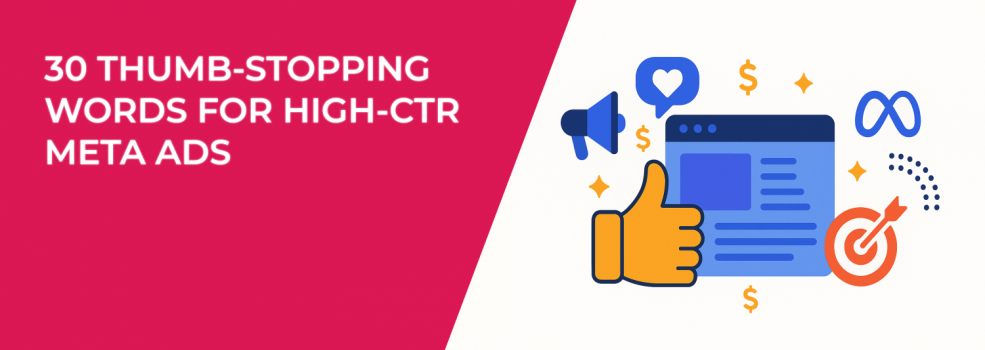In the world of Meta advertising, the difference between a scroll and a click often comes down to a single word.
One word.
A word that triggers curiosity, creates urgency, offers clarity, or speaks directly to a user’s frustration. These words — when chosen carefully — don’t just lift your CTR. They filter for relevance, build connection, and push action.
This guide walks you through 30 of the most effective words for Meta ad copy, explains why they work, and gives you tips for using them without sounding clickbaity. If you care about ad performance, this is your swipe file.
Why Your Words Matter More Than You Think
In Meta ads, design grabs attention, but copy holds it. Your headlines, primary text, and CTAs carry the message — and they have to do it fast.
The best-performing ads combine precise targeting with clean, persuasive messaging. Using powerful words in the wrong way just creates noise. Using them well? That’s how you stop the scroll and earn the click.
Let’s look at the words that work.
1. High-Urgency Words
These spark action — fast. Use when promoting deadlines, limited availability, or event-based ads.
-
Limited — Implies scarcity. People want what they might lose.
-
Today — Anchors the action in the present.
-
Now — Adds immediacy to CTAs.
-
Ending — Creates finality. Stronger than “soon.”
-
Final — Signals a true last chance.
-
Hurry — Suggests ticking time. Works well in time-boxed offers.
Urgency grabs attention and pushes people to act instead of waiting. These words can boost CTR when there’s a real deadline or limited supply. Just be honest — fake urgency turns people off quickly.
2. Value-Focused Words
These signal what the user gets — without making them work for it.
-
Free — Still effective. Just don’t stretch its meaning.
-
Save — People love avoiding loss. Add specific numbers.
-
Bonus — Extra value, when it’s actually meaningful.
-
Access — Feels exclusive. “Unlock access” works better than “Get it.”
-
Exclusive — Makes the offer feel custom.
-
Bundle — Suggests more for less. Use in ecommerce and services.
Learn how to present value the right way in Crafting Compelling Facebook Ads Copy That Converts.
3. Curiosity-Driven Words
These create gaps in knowledge that people instinctively want to close.
-
Secret — Suggests hidden insight. Only use when you’re offering something uncommon.
-
Hidden — Implies discovery. “The hidden mistake” works better than “a mistake.”
-
Untold — Promises something fresh. Avoid for surface-level content.
-
Behind-the-scenes — Adds depth. Great for transparency or product stories.
-
Truth — Powerful when you challenge common assumptions.
-
Revealed — Suggests a payoff. “Revealed” should lead to a result.
Curious how psychology plays into copy performance? Don’t miss The Psychology of Facebook Ads.
4. Problem-Aware Words
These name real frustrations. If your audience feels seen, they’ll keep reading.
-
Struggling — Human and soft. Use at the start of a question.
-
Mistake — Self-reflective. “The #1 mistake marketers make” catches attention.
-
Wrong — Pushes against assumptions.
-
Costly — Triggers fear of loss. Use it with examples or stats.
-
Broken — Strong emotional weight. Works well in problem-solution ads.
-
Frustrating — Highly relatable. “Still frustrating?” makes a great hook.
These words work because they show you understand what people are dealing with. When your ad speaks to a real problem, it feels more honest and helpful. Just make sure you follow up with a clear, real solution.
5. Clarity Words
These reduce mental effort. They make your offer feel easy, trustworthy, and actionable.
-
Simple — Suggests ease. Be careful — don’t use it on anything complex.
-
Easy — Good in CTA buttons. “Easy to apply” feels more credible than “effortless.”
-
Proven — Adds authority. Use only with real results or testimonials.
-
Tested — Suggests reliability. Especially in playbooks or tools.
-
Results — Clear outcome. But show the kind of results you mean.
-
Guaranteed — Reduces risk. Be specific — money back? Satisfaction?
Clarity builds confidence. These words help people feel like they know what to expect — and that it won’t be a hassle. Use them to lower friction and make taking the next step feel safe and simple.
How to Use These Words (Without Becoming Clickbait)
Use these as tools, not tricks. They only work when they match the offer.
Here’s how to stay sharp:
-
Keep your promise tight — “Free” must mean free. No strings.
-
Don’t overhype — “The untold truth” better not be a recycled blog tip.
-
Avoid stacking power words — “Final limited free bonus bundle” = ad fatigue.
-
Test small changes — One-word shifts in CTA copy can change performance.
-
Write to your audience’s mindset — Not every word fits every niche.
Using strong words isn’t about being flashy — it’s about being clear and believable. When your copy reflects the real value of your offer, people are more likely to trust you and click. Honesty always outperforms hype in the long run.
Final Word: Copy Gets the Click, Context Gets the Conversion
Great words stop the scroll. But great offers, great targeting, and great relevance close the loop.
If you want to make your copy really convert, combine these words with:
-
The right audience segmentation,
-
Real proof behind your claims,
-
And a strong follow-through after the click.
Words grab attention, but context builds trust. When your messaging, targeting, and offer all align, you don’t just get clicks — you get results that actually matter. Keep testing, keep refining, and make every word count.

